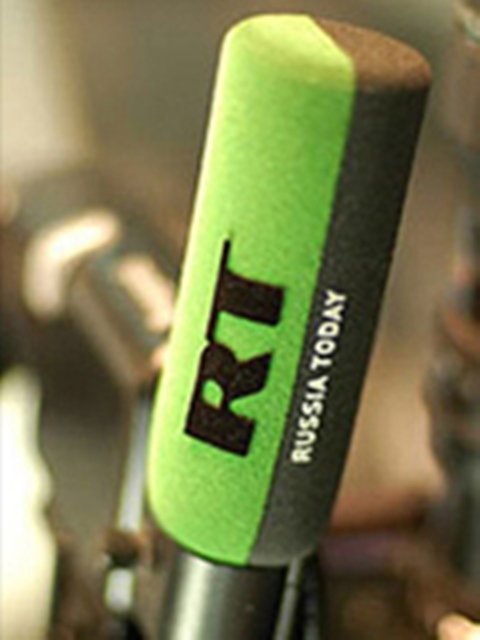Breaking news from Times: Bank to close all RT ops accounts in UK … last year

A riveting true story of a fake about a not-fake.
It’s the dead of August. Trump is playing golf. Putin is fishing for pike. The British Parliament is in recess. Even North Korea still seems to be on the fence about blowing up the world.
The mood in the Times of London newsroom is one of dejection and desperation. Fortunately for news-lovers, the lack of activity isn’t enough to stop the paper’s intrepid journalists. If there’s no story to write about, well gosh darn it, why not just make one up?
Unfortunately for the Times, the year is 2017 and there is global war being waged against fake news. These days, making up stuff willy-nilly is frowned upon. But wait! There’s a loophole. As we’ve seen time and time and time again when it comes to Russia in general – and RT in particular – anything goes for the mainstream press.
Which must be how the Times conjured up the following super-exclusive scoop, courtesy of its investigations department, no less: apparently, in October 2016 a British state-owned bank by the name of NatWest decided to stop servicing Russia Today TV UK Ltd – the firm executing all RT operations in the UK. Also, according to the Times, it’s fake news!
A trip back in Times
So what exactly is fake here? The Times reveals that the letter from the bank announcing the closures was, in fact, addressed to Russia Today TV UK Ltd., rather than to RT itself. And this fact, in the newspaper’s apparent interpretation, means the account closures had nothing to do with RT.
This is the information that took the Times all of 10 months to dig up! Someone deserves a bonus.
Being the beacon of integrity that they are, the Times crew contacted RT to offer us a right to comment on what they referred to as RT running a “fake” about itself – which is how we found out about this gem of investigative journalism (apologies for redundancy, we’re still tickled by the fact that this news is being worked on by the newspaper’s Investigations Editor).
First of all, the Times could have saved itself some time by simply going to the RT website, where we had posted a photo of the letter in question, last October. Had they done so, they might also have noticed this little nugget of information: “[…] RT is the brand name of a global network, and Russia Today TV UK Ltd is the sole provider of all of RT’s operations in the UK, which includes servicing the salaries of the entire 60+ staff of the RT UK television channel. As NatWest is Russia Today TV UK Ltd’s sole banking facility, the bank is, in fact, closing banking access to all of RT’s operations in the UK.”
Statements to this end were also provided to numerous media outlets and were run by the likes of the BBC. In fact, the Times itself inquired with RT about the relationship between NatWest and Russia Today TV UK Ltd on October 18, 2016, and was told explicitly that “NatWest provides RT’s principle UK banking facility to Russia Today TV UK Ltd,” which is “RT's UK operation.”
That Times request, ironically, was signed with the same name as the latest email.
Yet on August 10, 2017, the Times editors seem to believe that they have suddenly uncovered RT’s deep, dark secret.
Down a rabbit hole and through a looking glass
As a cherry on top, the Times posits in its email that RT made up this supposed disinformation to serve a Kremlin agenda.
Dear reader, if by now you are confused as to what exactly RT made up, you’re not alone – because so are we. The Times is accusing RT of “fake news” even though it cannot dispute a single fact published by RT about the story in question. In other words, it is trying to make up a fake about a non-existent fake – and not even trying to hide it.
The entire premise of the Times’ comment request seems to have been honed by the ‘Did you stop beating your wife, yes or no?’ school of journalism, with Beckettian-levels of absurdity mixed in for good measure.
But it’s the dog days of summer, and we will accept this latest Times rigmarole for what it is: a source of endless amusement.
Except for the bit where the Times straight-up lied in its beaming j’accuse! missive, saying that NatWest had only threatened to close RT accounts, when in fact the bank had already made the decision to do so – a decision that was “final” and “not subject to any discussion.” Because that one’s just sad. It seems like the poor Times got tangled up in its own web of fakes.
Unoriginal sin
The Times’ embarrassing attempt to cook up a conspiracy out of nothing is just the latest entry among the mainstream gang’s consistently Russophobic, fakes-fighting fiascos.
The Washington Post infamously tried to smear hundreds of journalists and outlets – most of them American – as agents of the Kremlin based on compromised research it was subsequently forced to disavow.
The German Marshall Fund of the United States has just launched its Hamilton 68 project, which is supposed to identify “Russian propaganda” by tracking 600 social media accounts. It was ridiculed right away for “exposing” that posts by the Russian Foreign Ministry carry the views of the Russian government.
The trouble w/ a new effort to expose Moscow's “active measures” against Americans. A critical look at Hamilton 68. https://t.co/hJwfqmkBGtpic.twitter.com/gfCKrQeKUV
— Meduza in English (@meduza_en) August 3, 2017
It further discredited itself by placing American outlets like the Atlantic and the Daily Caller on its watch list, and attempting to smear legitimate, factual news reports by foreign outlets, including RT, as “disinformation” if those pieces didn’t paint an unequivocally-glowing picture of the US.
Clearly, the Times didn’t want to miss out on the fun.
We can’t wait to see what they come up with next.
PS Following an outpouring of support from the general public and prominent British figures, NatWest decided to reverse its decision and continue its working relationship with RT – sorry, with Russia Today TV UK Ltd.
PPS 10 months!
The statements, views and opinions expressed in this column are solely those of the author and do not necessarily represent those of RT.













